|
|
|
Sort Order |
|
|
|
Items / Page
|
|
|
|
|
|
|
| Srl | Item |
| 1 |
ID:
092403
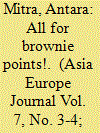

|
|
|
|
|
| Publication |
2009.
|
| Summary/Abstract |
The emergence of a global new media model aided by the technological revolution of the twenty-first century, economic globalization and political neo-liberalism, has transformed the traditional old model of media as a democratic pillar of public service into a new profit-oriented model of media as a corporate business enterprise primarily dependent on advertisement revenues. This change in the media ownership has had significant negative implications for media coverage and content. In this changed scenario of eclipse of investigative and critical journalism and triumph of infotainment journalism, this new corporate media, especially in the post-9/11 era, has nonetheless made itself particularly vulnerable to the terrorist manipulation of mass media as an advertisement agent for terror. Through the specific case study of the media coverage of Mumbai terror attacks on November 26, 2008, this study attempts to reveal how the commercial agenda of the new media ends up furthering the terrorist agenda, albeit in immediate short run, of inculcating mass hysteria, irrational mob fury directed against the state thereby eroding, however temporarily, popular sovereignty of the state.
|
|
|
|
|
|
|
|
|
|
|
|
|
|
|
|
| 2 |
ID:
131642
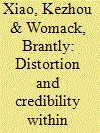

|
|
|
|
|
| Publication |
2014.
|
| Summary/Abstract |
Behind the problems of credibility of public official information in China lie two patterns of internal information distortion, one restricting the downward flow of sensitive general information and the other filtering the upward flow of local information. Information gathered at the center is increasingly restricted as it is transmitted down the bureaucracy. Meanwhile, the 'facts on the ground' are sifted by local official interests at each level of upward transmittal. Awareness of these distortions has been increased by the Internet revolution, but the structures that encourage them remain in place. An empirical survey of different levels of local cadres in Guangdong Province indicates the different perspectives produced by different positions in the internal information system. Municipal level officials, who have more general information but less diverse local information, tend to be more positive about the quality and objectivity of statistics, while their staff members, further from central sources but closer to messy local realities, are more skeptical.
|
|
|
|
|
|
|
|
|
|
|
|
|
|
|
|
| 3 |
ID:
047051
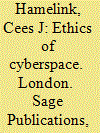

|
|
|
|
|
| Publication |
London, Sage Publications, 2000.
|
| Description |
xi, 207p.
|
| Standard Number |
9780761966692
|
|
|
|
|
|
|
|
|
|
|
|
Copies: C:1/I:0,R:0,Q:0
Circulation
| Accession# | Call# | Current Location | Status | Policy | Location |
| 044469 | 303.4833/HAM 044469 | Main | On Shelf | General | |
|
|
|
|
| 4 |
ID:
111729


|
|
|
|
|
| Publication |
2012.
|
| Summary/Abstract |
The challenge is to translate the technological revolution, which has made us more equal in our access to information and communications tools, into a New World Order where we can become equal on all levels of life.
|
|
|
|
|
|
|
|
|
|
|
|
|
|
|
|
| 5 |
ID:
129493


|
|
|
|
|
| Publication |
2014.
|
| Summary/Abstract |
This paper uses a formal model to analyze the effects of political military competition among states on the size and composition of state. Great economies of scale in warfare, even distribution of military capability among contestants and greater value of contested resources generate higher level of military capacity and growth of government. If there is decreasing return to scale in state revenue generating function and provision of public intermediate inputs, then there will be an increasing size of civilian public sector relative to that of military. The paper finally studies how waves of military revolutions affected international political military competition and the size and composition of government in history.
|
|
|
|
|
|
|
|
|
|
|
|
|
|
|
|
| 6 |
ID:
173296
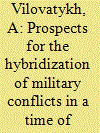

|
|
|
|
|
| Summary/Abstract |
AMID the current technological breakthrough, the spread of information and communication technologies (ICT) is one of the important factors shaping a new political reality in Russia and the world as a whole. Scholars note that at the present time, government agencies, the business community and private users are increasingly dependent on computer technology and access to information networks [2]. Likewise, participants in world politics have significant advantages in achieving their goals when one of the tools they use to pursue their objectives is the global information and communication space, which essentially has no borders.
|
|
|
|
|
|
|
|
|
|
|
|
|
|
|
|
| 7 |
ID:
073181


|
|
|
| 8 |
ID:
089239
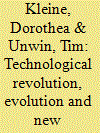

|
|
|
|
|
| Publication |
2009.
|
| Summary/Abstract |
This paper provides an overview of recent developments in the use of information and communication technologies for development, and argues that, while they do indeed offer new potential for resolving some of the classic dilemmas of development policy and practice, insufficient attention has yet been paid to the lessons that can be learnt from previous information and communication initiatives
|
|
|
|
|
|
|
|
|
|
|
|
|
|
|
|
| 9 |
ID:
107300


|
|
|
|
|
| Publication |
London, Frank Cass, 1989.
|
| Description |
107p.Hbk
|
|
|
|
|
|
|
|
|
|
|
|
Copies: C:1/I:0,R:0,Q:0
Circulation
| Accession# | Call# | Current Location | Status | Policy | Location |
| 039070 | 609.1724/KAP 039070 | Main | On Shelf | General | |
|
|
|
|
|
|
|
|
|